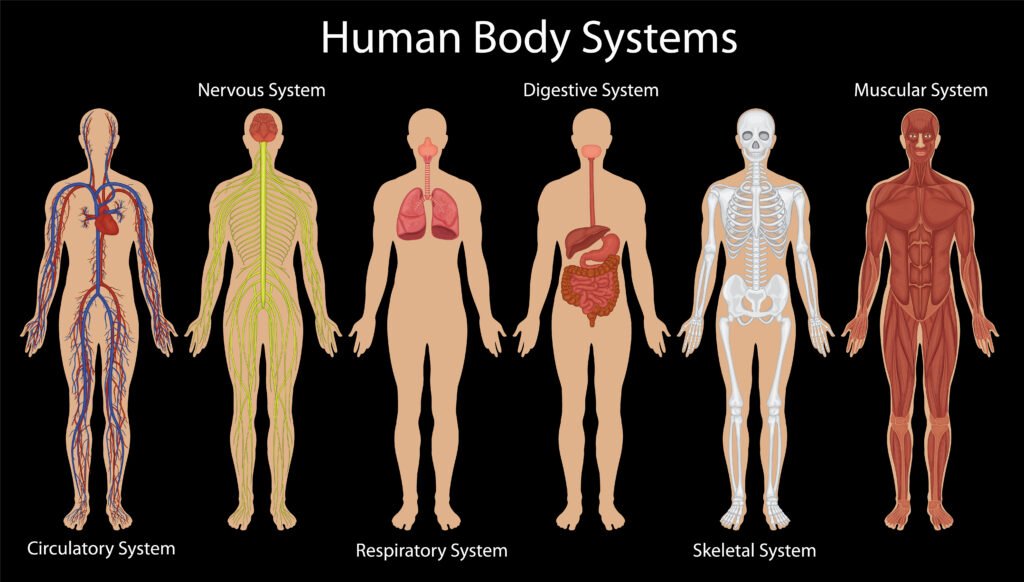
The human body is a marvel of nature, filled with countless mysteries and surprises. From the intricate workings of our organs to the remarkable capabilities of our senses, there’s always something new to learn about our amazing bodies. In this article, we’ll explore some surprising Human Body Facts you probably didn’t know, shedding light on the fascinating aspects of our physiology that often go unnoticed. Let’s dive in and uncover the secrets of the human body!
In this article, we’ll explore 20 surprising facts about the human body that are sure to fascinate and amaze you.
Did you know that your skin is your body’s largest organ? It acts as a protective barrier against germs, regulates body temperature, and helps you sense touch, heat, and cold.
Your heart beats about 100,000 times a day, pumping blood through your body’s vast network of blood vessels. This is equivalent to over 2.5 billion beats in an average lifetime!
The human brain is incredibly complex, containing over 86 billion neurons that transmit signals throughout the body. It’s responsible for everything from thoughts and emotions to basic bodily functions like breathing and digestion.
Your bones may seem solid, but they’re actually alive and constantly changing. Your body removes old bone tissue and replaces it with new bone tissue in a process called remodeling.
The human eye can distinguish between approximately 10 million different colors, thanks to specialized cells called cones in the retina. This allows us to see the world in all its vibrant hues.
Your liver is a multitasking powerhouse, performing over 500 functions essential for life. It helps detoxify harmful substances, metabolize nutrients, and store energy for later use.

Interesting Isn’t It.
Your muscles are more than just bundles of tissue—they’re also highly efficient energy converters. Muscles can convert chemical energy from food into mechanical energy, allowing you to move and perform physical tasks.
Your digestive system is home to trillions of bacteria that play a crucial role in maintaining your overall health. These beneficial bacteria help break down food, produce vitamins, and support your immune system.
Your lungs are remarkably efficient at extracting oxygen from the air and delivering it to your body’s cells. Each time you take a breath, tiny air sacs called alveoli expand and contract, allowing for gas exchange.
Your kidneys filter around 120 to 150 quarts of blood every day, removing waste products and excess fluid to keep your body in balance.
The human nose is capable of detecting over 1 trillion different scents, making it one of the most sensitive sense organs in the body.
Your taste buds aren’t just limited to sweet, salty, sour, and bitter. There’s a fifth taste sensation called umami, which is associated with savory or meaty flavors.
Your skin sheds about 30,000 to 40,000 dead skin cells every minute, adding up to over 8 pounds of skin cells shed each year.
Human body produces around 2 to 4 pints of saliva every day, helping to moisten food, break it down, and aid in swallowing.
Did You Knew This Human Body Facts?
The human skeleton is made up of around 270 bones at birth, but this number decreases to approximately 206 bones in adulthood as some bones fuse together.
Human brain generates about 12 to 25 watts of power when awake—enough to power a small light bulb!
Your stomach lining produces a new layer of mucus every two weeks to protect itself from the corrosive effects of stomach acid.
Your body contains enough DNA to stretch from the Earth to the Sun and back over 600 times!
The human body is capable of surviving without food for several weeks, but only a few days without water. Staying hydrated is essential for maintaining optimal health and function.
Your body’s cells are constantly dividing and multiplying to replace old or damaged cells. In fact, it’s estimated that you lose and replace around 50 to 70 billion cells every day!
These 20 surprising facts about the human body offer just a glimpse into the incredible complexity and wonder of our physiology. By gaining a deeper understanding of how our bodies work, we can better appreciate the remarkable capabilities of the human form.
Whether it’s the beating of our hearts, the firing of our neurons, or the regeneration of our cells, the human body truly is a marvel of nature.